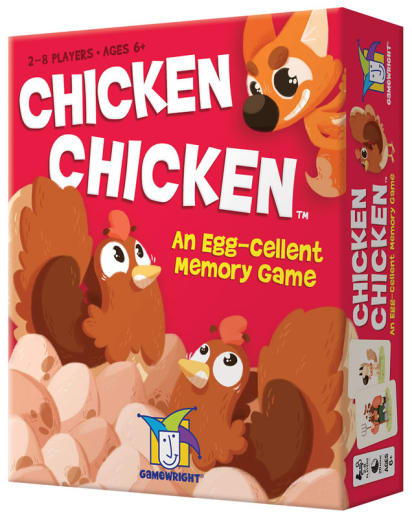This “Egg-cellent memory game" is simple; once you've seen five egg cards overturned, be the first to slap the deck and get a point. However, other cards in play may mess up your count! Hens sit on eggs and those eggs are out of play, but if a fox comes along, the hen runs away and the egg is back in play. Will you be able to keep track of the eggs with all the hens and foxes running around? Slap the deck too soon and the yolk's on you! Extra bonus cards allow for other play variations and add even more fun and confusion. First player to get 3 points wins. 2-8 players, with a playing time of approximately 20 minutes. ~ Megan
Chicken Chicken: An Egg-cellent Memory Game | Gamewright
SKU
056123
Grade 1-AD
These icons are designed to help you quickly understand and learn important information about our products.
Teaching Method
Traditional
Teacher-centered curriculum commonly used in classrooms that may include a text, teacher manual, tests, etc.
Charlotte Mason
A methodology based on the work of a 19th century educator who maintained that children learn best from literature (Living Books), not textbooks.
Classical
A methodology based on the Latin Trivium (three stages of learning), including the grammar stage (memorization and facts), logic stage (critical thinking), and rhetoric stage (developing/defending ideas).
Unit Study
A thematic or topical approach centered around one topic that integrates multiple subject areas.
Montessori (Discovery)
A methodology based on the work of a 20th century educator that emphasizes student and sensory-driven discovery learning and real-life applications.
Other
Other methodologies
Religious Content
Secular
Contains content contrary to common Christian beliefs (i.e. evolution).
Neutral
Avoids religious or theoretical topics or presents multiple viewpoints without preference.
Christian/Religious
Faith-based or including instructional religious content.
Learning Modality
Auditory
Learns through listening, talking out loud or reading out loud.
Visual
Learns through seeing, prefers written instructions and visual materials.
Kinesthetic/Tactile (Hands-On)
Learns through moving, doing and touching.
Multi-Sensory
Curriculum that employ a variety of activities/components.
Presentation
Sequential
Curriculum progresses through well-defined learning objectives. Emphasizes mastery before moving to the next topic.
Spiral
Topics and concepts are repeated from level to level, adding more depth at each pass and connecting with review.
Conceptual/Topical
Focus is on the “why,” often with a unifying concept as well as specific skills; coverage may be broader.
Teacher Involvement
Low Teacher Involvement
Student-led materials; parent acts as a facilitator.
Medium Teacher Involvement
A mix of teacher-led time and independent student work.
High Teacher Involvement
Teacher-led lessons; may utilize discussions, hands-on activities and working together.
Additional Materials Required
No other materials needed
Everything you need is included.
Other Materials Required
There are additional required resources that are a separate purchase.
Other Materials Optional
There are additional resources mentioned or recommended but are not absolutely necessary.
Consumable
Consumable
Designed to be written in; not reusable.
Non-Consumable
Not designed to be written in; reusable.
Our Price
$12.00 $12.00 $10.95
Rainbow Savings: $1.05
Warning
Choking Hazard
- Small parts. Not for children under 3 years.
Description
Publisher's Description of Chicken Chicken: An Egg-cellent Memory Game | Gamewright
Count your chickens before they hatch! Reveal cards one at a time, keeping a mental tally of the eggs. Be the first to slap the pile when you think the total equals five. But watch out! Chickens, foxes, dogs, and others get mixed in to fowl up your count. The more characters you add, the more eggciting the game! Win three rounds and you rule the roost!
Details
| Product Format: | Other |
|---|---|
| Grades: | 1-AD |
| Brand: | GameWright |
| EAN/UPC: | 0759751002596 |
| Length in Inches: | 5.75 |
| Width in Inches: | 4.75 |
| Height in Inches: | 1.375 |
| Weight in Pounds: | 0.45 |
Videos
Reviews

